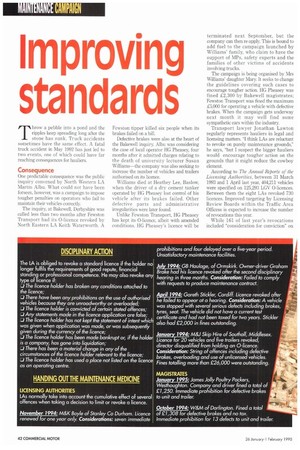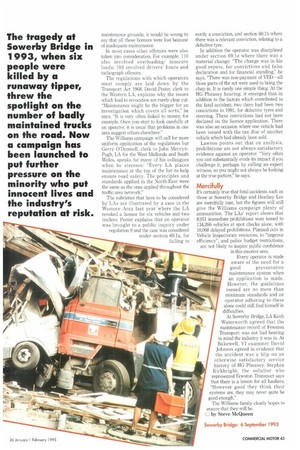Improving standards
Page 46

Page 47

If you've noticed an error in this article please click here to report it so we can fix it.
Throw a pebble into a pond and the ripples keep spreading long after the stone has sunk. Truck accidents sometimes have the same effect. A fatal truck accident in May 1992 has just led to two events, one of which could have far reaching consequences for hauliers.
Consequence
One predictable consequence was the public inquiry convened by North Western LA Martin Albu. What could not have been forseen. however, was a campaign to impose tougher penalties on operators who fail to maintain their vehicles correctly.
The inquiry, at Bakewell, Derbyshire was called less than two months after Fewston Transport had its 0-licence revoked by North Eastern LA Keith Vv'aterworth. A Fewston tipper killed six people when its brakes failed on a hill.
Defective brakes were also at the heart of the Bakewell inquiry. Albu was considering the case of local operator HG Pheasey, four months after it admitted charges relating to the death of university lecturer Susan Williams—the company was also seeking to increase the number of vehicles and trailers authorised on its licence.
Williams died at Heathey Lee, Baslow, when the driver of a dry cement tanker operated by HG Pheasey lost control of his vehicle after its brakes failed. Other defective parts and administrative irregularities were later found.
Unlike Fewston Transport, HG Pheasey has kept its 0-licence, albeit with amended conditions. HG Pheasey's licence will be terminated next September, but the company can then re-apply. This is bound to add fuel to the campaign launched by Williams' family, who claim to have the support of MPs, safety experts and the families of other victims of accidents involving trucks.
The campaign is being organised by Mrs Williams' daughter Mary. It seeks to change the guidelines covering such cases to encourage tougher action. HG Pheasey was fined £2,300 by Bakewell magistrates; Fewston Transport was fined the maximum £5,000 for operating a vehicle with defective brakes. When the campaign gets underway next month it may well find some sympathetic ears within the industry.
Transport lawyer Jonathan Lawton regularly represents hauliers in legal and licensing matters. "I think LAs are reluctant to revoke on purely maintenance grounds," he says, "but I suspect the bigger hauliers would encourage tougher action on the grounds that it might reduce the cowboy element.
According to The Annual Reports of the Licensing Authorities, between 31 March 1993 and 1 April last year, 404,211 vehicles were specified on 125,293 LGV 0-licences. Between them the eight LAs revoked 730 licences. Improved targeting by Licensing Review Boards within the Traffic Area Officess is expected to increase the number of revocations this year.
While 161 of last year's revocations included "consideration for conviction" on maintenance grounds, it would be wrong to say that all those licences were lost because of inadequate maintenance.
In most cases other offences were also taken into consideration. For example, 110 also involved overloading/ insecure loads; 103 involved drivers hours and tachograph offences.
The regulations with which operators must comply are laid down by the Transport Act 1968. David Pester, clerk to the Western LA, explains why the issues which lead to revocation are rarely clear cut: "Maintenance might be the trigger for an investigation which covers all sorts," he says. "It is very often linked to money, for example. Once you start to look carefully at an operator, it is usual that problems in one area suggest others elsewhere."
The Williams campaign will call for more uniform application of the regulations but Gerry O'Donnell, clerk to John MervynPugh, LA for the Vv'est Midlands and South Wales, speaks for many of his colleagues when he stresses: "Every LA places maintenance at the top of the list to help ensure road safety. The principles and standards applied in the North-East were the same as the ones applied throughout the traffic area network."
The subtleties that have to be considered by LAs are illustrated by a case in the Western Area last year where the LA revoked a licence for six vehicles and two trailers. Pester explains that an operator was brought to a public inquiry under regulation 9 and the case was considered under section 69.1a, for failing to notify a conviction, and section 69.1b where there was a relevant conviction, relating to a defective tyre.
In addition the operator was disciplined under section 69.1e where there was a material change: "The change was in his good repute, for convictions and false declaration and for financial standing," he says. "There was non-payment of VED—all those parts of the act were used to bring the chap in. It is rarely one simple thing. At the HG Pheasey hearing, it emerged that in addition to the factors which contributed to the fatal accident, two there had been two convictions in 1991, for defective tyres and steering. These convictions had not been declared on the licence application. There was also an occasion where one vehicle had been issued with the tax disc of another vehicle which had already been sold.
Lawton points out that on analysis, prohibitions are not always satisfactory evidence against an operator. "Very often you can substantially erode its impact if you challenge it, perhaps by calling an expert witness, so you might not always be looking at the true picture," he says.
Mercifully
It's certainly true that fatal accidents such as those at Sowerby Bridge and Heathey Lee are mercifully rare, but the figures will still give the Williams campaign plenty of ammunition. The LAs' report shows that 8,951 immediate prohibitions were issued to 134,266 vehicles at spot checks alone, with 10,068 delayed prohibitions. Planned cuts in Vehicle Inspectorate resources, to "improve efficiency", and police budget restrictions, are not likely to inspire public confidence in this emotive area.
Every operator is made aware of the need for a good preventative maintenance system when an application is made. However, the guidelines issued are no more than minimum standards and an operator adhering to these alone could still find himself in difficulties.
At Sowerby Bridge, LA Keith Waterworth agreed that the maintenance record of Fewston Transport was not bad bearing in mind the industry it was in. At Bakeveell, VI examiner David Johnson agreed in evidence that the accident was a blip on an otherwise satisfactory service history of HG Pheasey. Stephen Kirkbright, the solicitor who represented Fewston Transport says that there is a lesson for all hauliers: "However good they think their systems are, they may never quite be good enough."
The Williams family clearly hopes to ensure that they will be.
Li by Steve McQueen




























































































